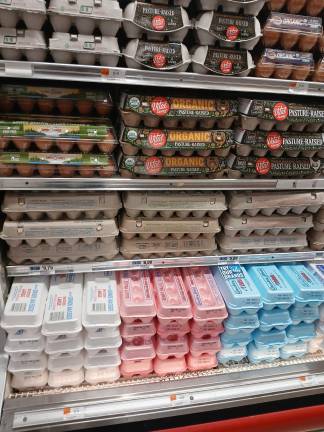Egg Shortages Spur Surging Prices; Trader Joe’s, Whole Foods, Costco Limit Purchases
Straus News toured the city checking egg prices and availability earlier this week. Trader Joe’s $4.99-per-dozen and Target’s at $3.49/dozen? Sold out. Whole Foods and Costco? A three-carton limit. Plus, here’s what we found at Wegmans, Morton Williams, D’Agostino, and Fairway.




It was not a Super Sunday if you were trying to buy eggs at Trader’s Joes in the East Village on Feb. 9 thanks to the ongoing shortages created by the growing Avian flu epidemic.
Despite imposing a one-dozen limit per customer, the shelves were stripped bare at Trader’s Joes that day. The store, on East 14th Street, had a curtain pulled down over empty shelves where eggs were usually displayed. The store said eggs would be restocked on Feb. 10 and that was “no yolk.” When we returned on Feb. 16, the shelves were emptied once again.
Target, which like Trader’s Joes was trying to hold the line, was sold out of eggs ranging from $3.19 to $6.89/dozen were gone by late afternoon on Feb. 16. Costco in East Harlem and Whole Foods, which has stores in Union Square, Chelsea (450 W. 33rd St.), and the UES (on East 57th Street), had placed three-carton limits on their customers. Fairway on the UWS had no limits, but a sign warned shoppers that “repeated outbreaks of Avian (Bird) Flu have affected the supply of eggs. As a result we have seen higher costs from our suppliers. We will continue to work with our suppliers to ensure availability.” They still had eggs in the $6.99 to $7.99 range when Straus News visited on Feb. 12.
The problem does not look as if it will abate any time soon. The Consumer Price Index released by the Bureau of Labor Statistics on Feb. 12 showed egg prices surged 15.2 percent in January compared with a year ago, making it the largest increase in egg prices since June 2015, according to the bureau.
Wegmans on Astor Place, which had pledged to hold the line on its egg prices, had plenty of eggs available and at reasonable prices when Straus News stopped by on Feb. 9. One couple that said they shopped there about twice a month, snagged a dozen eggs for $5.49. “It’s about $11 at our neighborhood grocery store,” said a young woman, proudly displaying the dozen eggs plucked from the well-stocked shelves in the underground level of the store.
A shopper named Lamar at the Morton Williams on East 23rd Street and Second Avenue said, “This store is always well stocked. Uptown they have high prices and shortages.” Farther uptown, Morton Williams at First and 81st Street. was well stocked when Straus News stopped by on Feb. 12, but at a high price. The eggs were priced in the $8.99 to $9.99 per dozen range when Straus Media first visited, but later in the week at a Morton Williams farther uptown all eggs appeared to be priced at $9.99 a dozen.
At a D’Agostino on First Avenue and 23rd Street, the price was $7.49, but it was only for a six-pack of eggs, not the standard dozen, which meant the price for a dozen was really $14.98. D’Agostino’s and its sister chain, Gristedes, both owned by Red Apple, consistently had the highest prices with posted prices over $12 per dozen at one point. That high price point, a week ago, came a day after the store had completely sold out its supply of eggs. But on a return visit there were eggs at a slightly lower price point, around $9.99. The higher price seemed to curb demand and shelves were nearly full.
The problem behind the shortages and skyrocketing prices is that if bird flu is detected in one chicken, the entire flock has to be euthanized to block the spread. About 10 percent of the egg-laying chicken population has been euthanized in the United States so far, and the number of infected flocks is picking up steam. The pathogen in the latest outburst initially was confined largely to California, but it has recently spread eastward. Seven cases of bird flu were detected in the metropolitan area recently, prompting Gov. Kathy Hochul on Feb. 7 to order all non-infected live poultry stores in the city, Westchester and Nassau and Suffolk counties to sell off chickens, shut down, and put their empty stores through a heavy deep cleaning. They were ordered to stay closed until at least Feb. 14. Hochul said it was being done with “an abundance of caution” and that no cases of human infection were detected anywhere in NYS.
But multiple birds have tested positive for H5N1 in New York City at parks and zoos in addition to the positive cases at live bird markets last week. The New York State Department of Environmental Conservation is testing dead birds found in public parks for the virus.
As the disease spreads, there appears to be no relief for the rest of 2025 when it comes to egg prices. The Economic Research Service of the US Department of Agriculture noted: “Farm-level egg prices continued to experience large monthly changes as the ongoing HPAI outbreak continued to affect egg-layer flocks, with volatile effects on prices.”.
That’s likely to translate into a 20.3 percent jump in egg prices at the retail level in 2025.
If there was any good news in the latest price forecasts, it is that some food categories will actually experience price drops. While beef prices are still volatile, poultry prices are predicted to decrease 1.4 percent in 2025, the USDA research arm predicted.
Prices for farm-level milk are predicted to increase by a modest 1.3 percent in 2025, according to the USDA.
There’s a split decision when it comes to fruits and vegetables. Prices for farm-level fruits are predicted to increase by 8.6 percent in 2025 while farm-level vegetables are predicted to increase by only 1.4 percent this year.